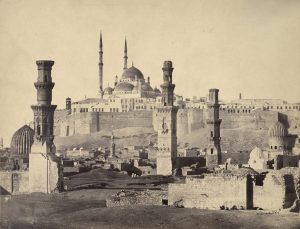by Kenneth Goudie
I have spent the better part of two and a half years working on how the life and career of Burhān al-Dīn Ibrāhīm b. ʿUmar al-Biqāʿī (809/1406–885/1480), a historian and Qurʾān exegete active in fifteenth-century Cairo, influenced how he wrote history. Originally from the village of Khirbat Rūḥā in the Anti-Lebanon mountains, al-Biqāʿī moved at a young age to Damascus before settling in Cairo, where he became a student of Ibn Ḥajar al-ʿAsqalānī (d. 852/1449). Through the patronage of Ibn Ḥajar, al-Biqāʿī was appointed the personal tutor of Sultan Jaqmaq and the resident Qurʾān exegete at the Ẓāhir Mosque; he later became a confidante of Sultan Īnāl. He is best known to modern scholarship for his embroilment in three controversies, which were respectively on the use of the Bible in Qurʾān exegesis, the poetry of Ibn al-Fāriḍ, and the theodicy of al-Ghazālī: these three controversies defined the downward trajectory of his later career from 868/1464 until his death in 885/1480.
The idea which underpins much of my research is that the distinction made between texts and their contexts needs to be collapsed, that al-Biqāʿī reveals himself in what he writes, and that this can be the basis for developing a messier and more nuanced understanding of how al-Biqāʿī’s life and career shaped his writing of contemporary history. Practically, this has meant focusing primarily on his sense of self, how he was perceived by other historians, and how he tried to make a living in the competitive world of the fifteenth-century Cairo Sultanate. I have been exploring these through his own writings and the writings of his contemporaries. The main works of his on which I’m focusing are his chronicle, the Iẓhār al-ʿaṣr li-asrār ahl al-ʿaṣr (‘Lightening the Dusk with regard to the Secrets of the People of the Age’), and his biographical dictionary, the ʿUnwān al-zamān bi-tarājim al-shuyūkh wa‑l‑aqrān (‘The Epitome of the Age through the Biographies of Shaykhs and Peers’). The Iẓhār al-ʿaṣr especially reveals al-Biqāʿī to be a skilled raconteur: interspersed amongst his accounts of political events are salacious gossip, anecdotes, and even considerable autobiographical information. His ʿUnwān al-zamān includes an autobiography which, when coupled with the autobiographical material in the Iẓhār al-ʿaṣr, provides us with a distinctly personal insight into and interpretation of the history of the fifteenth century.
If you’re interested in learning more about the conclusions about his life which I’ve made so far, you can check out the latest episode of DAWLA: New Histories of the Medieval Middle East.
https://soundcloud.com/dawla-new_histories/al-biqai

